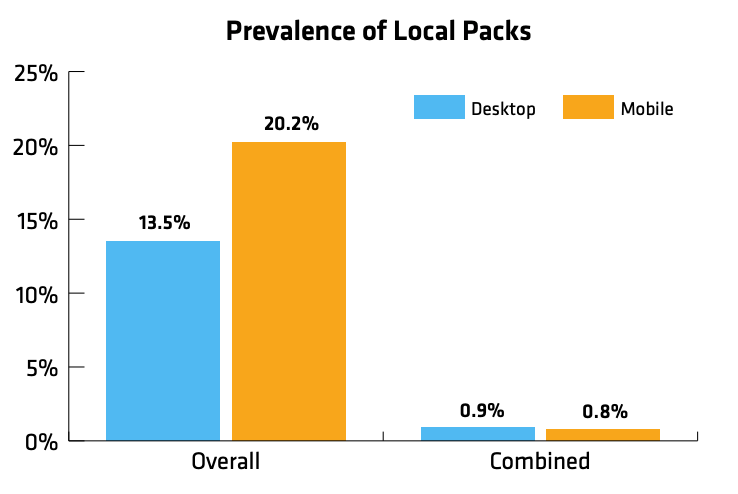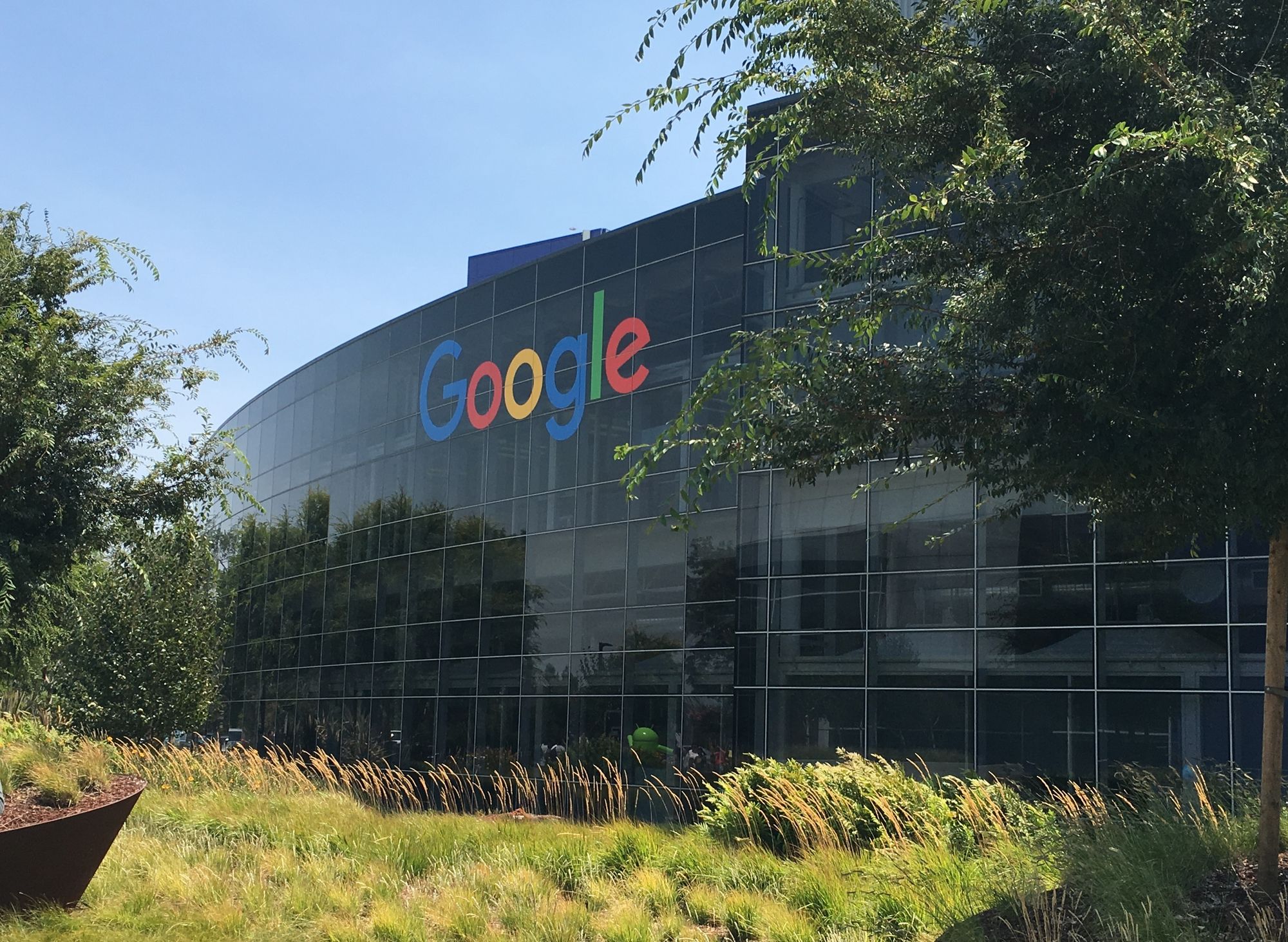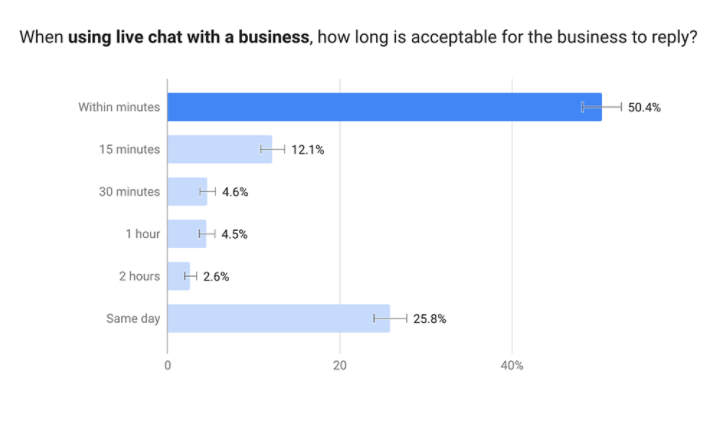EYWTKA Snippets, Stuck with Google, Chat vs. SMS Response Times

Take our 5-minute monetization survey. We'll love you for it.
Snippets Not on Local Pack SERPs
Moz has come out with a report covering almost everything you might want to know about Google's Featured Snippets. It's based on an analysis of 3.6 million search results (desktop and mobile). Featured Snippets ("position zero") used to be a bonus position above the normal page ranking. That changed earlier this year when Google said it would remove "duplicate content" in the SERP. Snippets are much more likely to appear on the desktop than in mobile and they're most common in the US (vs. UK, Canada, Aus). Roughly 15% of US desktop results had a snippet in the Moz study. Queries asking actual questions are more likely to trigger snippets. And Moz found most snippets are drawn from what would otherwise be SERP positions 1 - 3. Snippets also tend to appear on pages with "people also ask" boxes. However they rarely appear in local results.

Our take:
- Snippets are one manifestation of Google's ongoing effort to provide "answers not links."
- Snippets also provide the basis for a majority of Google Assistant results, especially in Google Home/Nest devices.
- Featured snippets tend to get relatively few clicks. So there's a legitimate debate about how valuable that position actually is.
So, Are We Stuck with Google?
It's a paradox: Google is becoming increasingly sophisticated about understanding language, search intent and images. But there's a growing perception that search is getting worse, due to SERP ad clutter – and other complaints (e.g., here, here). Yet many insiders can't envision a future not dominated by Google. That's perhaps because we tend to see the future as an incremental update of the present. In that context, Glen Gabe offers a bullish take on the integration of Google search and Discover (Google feed) to create a "shopping assistant." Another "assistant" scenario shows how language models (AI-driven bots) are now using search to deliver better answers. And Google has for years held up the Star Trek computer as a model for the future of search – though today's voice assistants are far short of that ideal.

Our take:
- Search as it stands is the best available tool for many tasks. But there's also lots of noise, low-quality content, gaming and fraud.
- In some cases social media is operating as a search alternative for discovery. But it isn't a search replacement.
- Google's economic self-interest (ads) is an obstacle to creating a true successor to today's search experience. It will have to come from outside Google.
Survey: SMS vs. Live Chat Response Times
According to a 2020 GMB study by Places Scout, only 19% of business owners responded to local reviews on Google – and it took them an average of 25 days! Yet consumers expect much faster responses. In a related vein, a new survey of 2,000 US adults from Leadferno explores consumer response-time expectations for live chat vs. SMS. Generally speaking, consumers expect faster responses from live chat than from SMS, which is not a surprise. Just under half (49%) said they expected a response to a text within two hours. The other half were comfortable with a same day or next-day response. By comparison, 73.6% of chat users expected a response in two hours or less, with 50% expecting one "within minutes." The survey then asked what consumers do if they discover that live chat is offline. The majority (57%) said they would simply abandon the website. One conclusion is that "offline live chat" could be turning away customers.

Our take:
- Fast responses to prospects are often the difference between capturing and losing revenue. This is common sense but not widely practiced.
- SMBs face challenges managing multiple communication channels, although they do a better job of responding to reviews than enterprises.
- Google, Facebook and Yelp all reward or otherwise try to encourage fast(er) and more responses to chat/messages with posted scores.
Recent Analysis
- Details from the FTC's 'HomeAdvisor Cheated SMBs' Complaint, by Mike Blumenthal.
- Google Increasingly Showing Product Images in Local Packs, by Mike Blumenthal.
- Near Memo episode 56: Google goes local with product search; FTC: HomeAdvisor cheated SMBs; SMBs are "sales averse."
Short Takes
- Google rolls out another product review ranking update.
- Google's collection of Android call, messaging data a GDPR violation.
- DOJ: Google hides business communications from legit scrutiny.
- Instacart "rebrand" reflects delivery diversification beyond groceries.
- Why we'll see more QR codes in video/TV ads in the future.
- Hackers steal some source code for Bing and Cortana.
- Security company Okta hacked, now its 15K customers nervous.
- Wineries shifting from Instagram to TikTok to attract young drinkers.
- See Nike's amazing 3D billboard campaign in Japan.
- Instagram opens up product tagging to all US users, not just "creators."
- Apple introduces new podcast metrics/analytics.
- Facebook considering stores to promote metaverse (NYT).
- Telsa working on smartphone that would be integrated with its cars.
- The return of "feature phones" among Gen Z.
Listen to our latest podcast.

How can we make this better? Email us with suggestions and recommendations.

